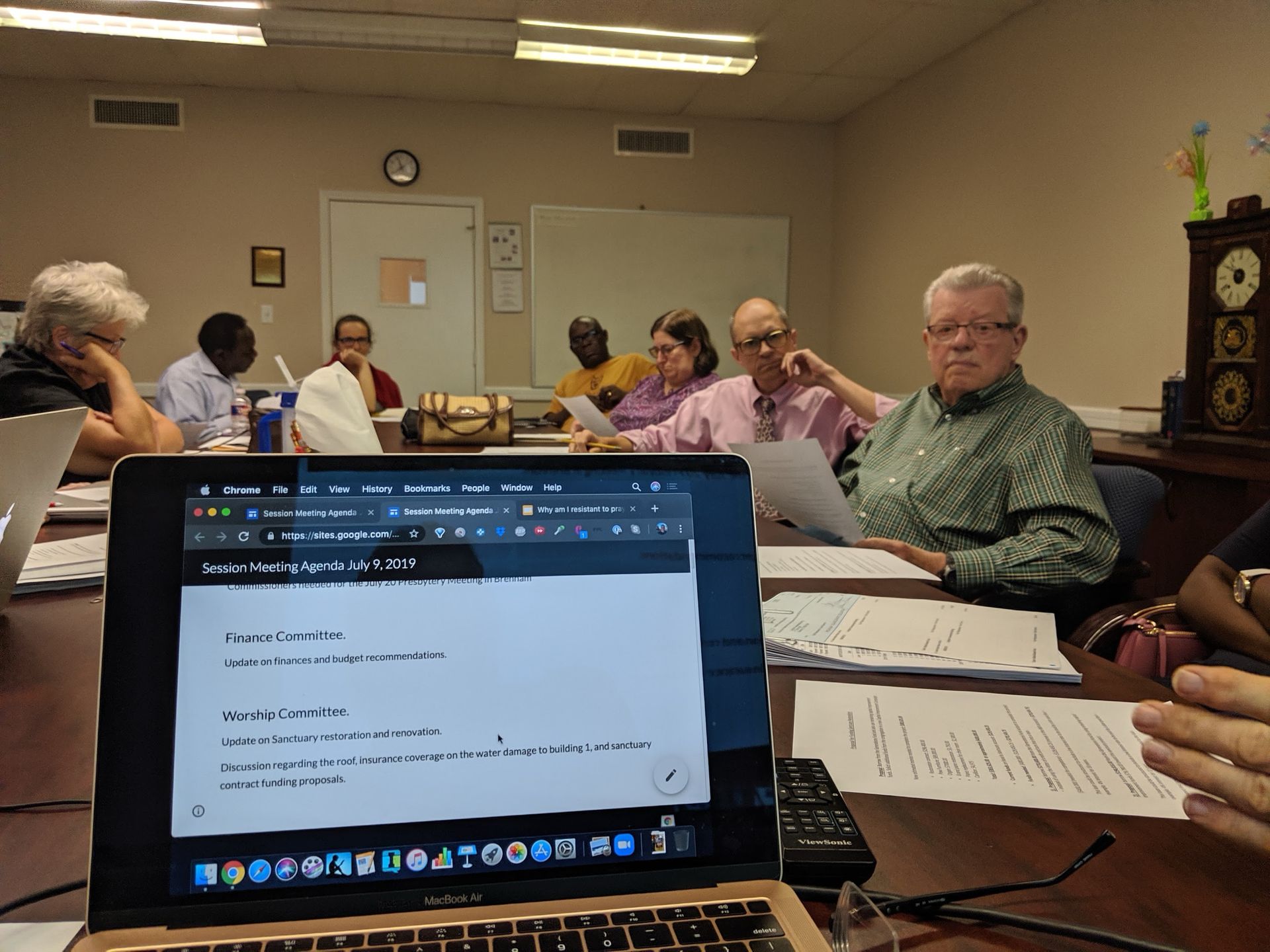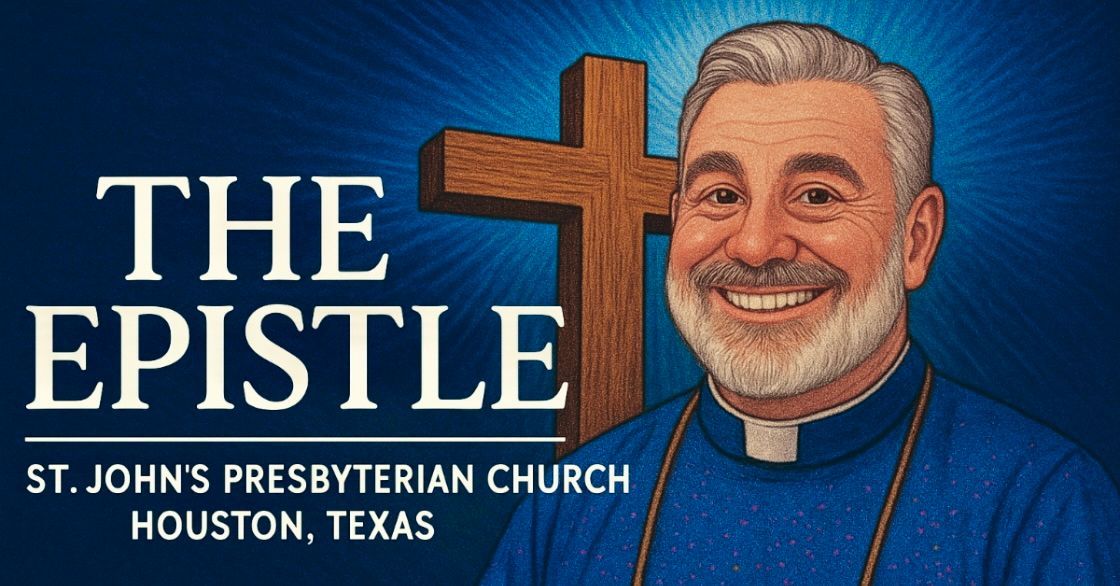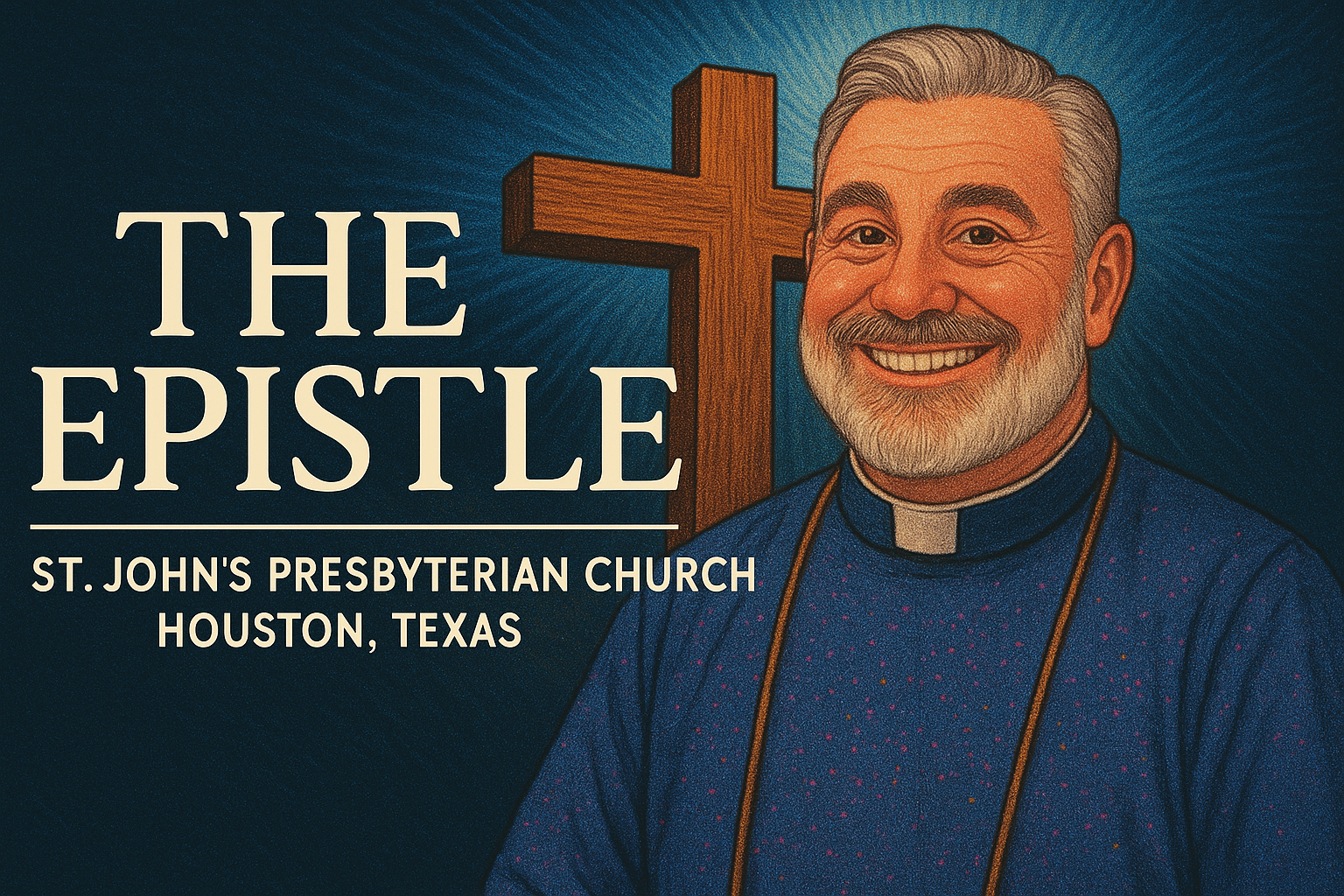Bible Study Near Me
What to Expect at St. John's Weekly Groups
When you search for "Bible study near me," you're probably looking for more than just a class. You want a place where Scripture actually comes alive, where questions are welcome, and where people know your name by the second week.
I'm Pastor Jon at St. John's Presbyterian Church in Houston, and I want to tell you what Bible study looks like here. Not the glossy brochure version, but the real thing: what happens when you walk in the door, what kind of people you'll meet, and why our approach to studying Scripture might be different from what you've experienced before.
What Makes Bible Study Actually Work
Here's something I've learned in years of pastoral ministry: the best Bible studies aren't the ones with the fanciest curriculum or the most charismatic teacher. They're the ones where people feel safe enough to say "I don't understand this passage" or "I'm struggling with what this means for my life right now."
That kind of honesty doesn't happen in crowds. It happens in rooms where you can see everyone's face, where someone notices if you're missing, where your story matters as much as the theological point being discussed.
At St. John's, we keep our groups deliberately small. Not because we can't fill a bigger room, but because we've seen what happens when Bible study becomes a performance instead of a conversation. When fifteen people gather around Scripture together, something shifts. The text stops being something you analyze from a distance and becomes something that examines you.
Sunday Morning: Studying What We're About to Hear
Our Sunday morning adult class meets before worship, and it does something most Bible studies don't do. We study the sermon text together before I preach on it.
Think about that for a moment. You walk into class at 10:00 AM, and we dig into the passage I'll be preaching on at 11:00. You get to wrestle with the text yourself, ask your questions, hear what catches other people's attention, and form your own thoughts before you hear mine.
This approach changes everything. When you've already spent an hour thinking about Jesus' words on anxiety from the Sermon on the Mount, you listen to the sermon differently. You're not passive anymore. You're engaged. Sometimes you're already disagreeing with me before I even start preaching, which is exactly what should happen when we take Scripture seriously.
Right now, we're working through "Kingdom Stewardship: Lessons from the Sermon on the Mount." Jesus has this way of turning everything upside down. He tells us not to worry about tomorrow, but he also tells us to plan wisely. He says to give to those who ask, but he doesn't say to enable every destructive pattern. He calls us to radical generosity, but he lived simply himself.
These tensions don't resolve easily. They require conversation. They need real people around a table saying "Wait, how does this actually work on Tuesday morning when my coworker asks to borrow money again?" or "What does seeking first the kingdom of God look like when I'm trying to decide about this job offer?"
That's what happens in our Sunday morning class. We don't rush to neat answers. We sit with the discomfort of Jesus' radical teaching and ask what it means for people who pay mortgages and worry about retirement and wonder if they're doing enough.
Earlier this year, we spent several weeks in the Book of Job. If you've never studied Job in a group, you're missing something profound. Job is the book that refuses to give us easy explanations for suffering. God never tells Job why all those terrible things happened. He just shows up in a whirlwind and reminds Job who's God and who isn't.
Studying Job together, we found permission to bring our honest questions about suffering. One person talked about losing a parent to cancer. Another shared about a prayer that seemed to go unanswered. Someone else admitted they'd been angry at God for years but felt guilty about it.
Those conversations don't happen in a lecture hall. They happen when Bible study becomes a safe place to tell the truth.
Sunday Afternoon: Going Deeper on Zoom
Not everyone can make it to church on Sunday morning. Maybe you work weekends. Maybe you live across town and fighting Houston traffic twice on Sunday isn't realistic. Maybe you're caring for someone at home and can't leave easily.
That's why our Sunday afternoon study meets on Zoom at 1:30 PM. You can join from your living room, your patio, your kitchen table, wherever you are.
This group tends to tackle books and topics that require sustained attention. Recently, they studied "The Way of Discernment" by Steve Doughty. That's not a light read. It's a serious exploration of how we actually figure out what God wants us to do with our lives.
The Zoom format creates an interesting dynamic. People feel simultaneously more comfortable and more focused. You're in your own space, which feels safe. But you're also on camera, which means you can't just zone out. The group stays small enough that everyone participates. There's nowhere to hide, which sounds intimidating but actually becomes freeing.
One of the things I appreciate about this group is their willingness to wrestle with hard questions. How do you know if you're following God's will or just your own preferences dressed up in religious language? How do you distinguish between God's voice and your own anxiety? How do you make major life decisions when Scripture doesn't give you a specific roadmap?
These questions matter because real faith requires real discernment. We're not looking for magic formulas or easy shortcuts. We're trying to develop the spiritual maturity to walk faithfully through complex situations.
Tuesday Afternoons: Women's Study on Zoom
Our Tuesday afternoon women's group has been meeting for years, and they've developed the kind of trust that only comes from showing up consistently for each other. They study Christian books, they pray for each other, they celebrate good news and sit with each other through hard seasons.
This isn't a "ladies' Bible study" in the stereotype sense. These are women who ask tough questions, who challenge superficial spirituality, who want their faith to matter in their actual lives. They're mothers and professionals and retirees and caregivers. They're dealing with aging parents and difficult marriages and career transitions and health crises.
The Tuesday group has taught me something important about women's ministry. Women don't need a separate, gentler version of faith. They need depth, honesty, and the freedom to bring their whole selves into the conversation. That's what this group offers.
Wednesday Evenings: Men's Intensive Study
Every other Wednesday at 6:30 PM, a group of men gathers for what they call an "intense one hour Bible study." They mean it. This isn't casual coffee and conversation. They dig into Scripture with focus and energy.
Men often tell me they want Bible study that respects their time and their intelligence. They don't want to waste an evening on surface-level discussion. They want to understand the text, ask hard questions, and figure out how this ancient book speaks to modern life.
The Wednesday night group delivers that. They move through passages carefully, looking at context and meaning and application. They hold each other accountable. They pray for each other's struggles. And they do it all in an hour because they know everyone has to get home to families or early morning jobs.
There's something powerful about men studying Scripture together. Not because men's faith is somehow different or more important, but because men need permission to be spiritually vulnerable, and that happens more easily in a group of other men who understand the pressures and expectations they're navigating.
What to Expect When You Show Up
Let me be practical for a moment. If you're thinking about visiting one of our Bible study groups, here's what will actually happen.
You'll walk in and someone will immediately introduce themselves. We notice visitors because we're small enough to know who belongs and who's new. That's not surveillance. That's hospitality.
You'll probably be offered coffee or water. We'll make sure you have whatever materials you need for the study. Someone will give you a quick orientation so you're not lost.
Then the study will start, and here's what you need to know: you don't have to talk if you don't want to. Nobody's going to put you on the spot or make you pray out loud or ask you to share your testimony. You're welcome to listen and learn until you're comfortable participating.
But when you do speak up, people will actually listen. They'll remember what you said. They might reference it next week. Your questions won't be dismissed as too basic or too challenging. This is how community forms, through the slow accumulation of real conversations about things that matter.
Why Small Groups Change Everything
I could give you all the Bible study options in Houston. I could point you to the megachurches with their excellent video curricula and their auditoriums full of people. Some of those studies are genuinely good.
But I keep coming back to this: faith grows best in close quarters. You need to be in a room small enough that your absence is noticed, your questions are heard, and your growth is celebrated. You need people who know your story well enough to pray specifically, challenge lovingly, and rejoice authentically.
That's harder to create in a crowd. Not impossible, just harder.
At St. John's, our whole approach to ministry prioritizes depth over breadth. We'd rather have five Bible study groups of fifteen people each than one massive class of seventy-five. We'd rather everyone know each other's names than have impressive attendance numbers.
This isn't because we're opposed to growth. It's because we've seen what actually transforms lives, and it's not the size of the program. It's the quality of the relationships formed while studying Scripture together.
Children's Bible Study During Worship
I should mention that we also offer Bible study for children at 11:00 AM on Sunday mornings during worship. It meets in a bright, age-appropriate space in our church office building, and it's designed to help kids engage with Scripture at their level.
Parents often tell us they appreciate having this option. Their children are learning biblical stories and principles in ways that make sense for their age, while the adults are free to focus fully on worship. It's not childcare. It's actual Bible study that takes children's faith development seriously.
The Tuesday and Wednesday Rhythm
Here's what I've noticed over the years: people who get involved in weekly Bible study start to change. Not in dramatic, overnight ways, but in the slow transformation that comes from regular exposure to Scripture in community.
The Tuesday women's group members start referencing what they learned months ago in casual conversation. The Wednesday men hold each other accountable to commitments they made during study. The Sunday morning class shapes how people hear the sermon and how they talk about faith during coffee hour afterward.
This is how discipleship actually works. Not through occasional intense experiences, but through the steady, unglamorous work of showing up week after week to study Scripture with the same people who are becoming your friends.
What We're Not
Let me be clear about what you won't find in our Bible studies.
You won't find anyone trying to sell you something or recruit you for a multi-level marketing scheme. It happens in church Bible studies sometimes, and it's always inappropriate.
You won't find political agendas disguised as biblical teaching. We study Scripture seriously, which means we let it challenge all of our political assumptions, left and right.
You won't find pressure to share more than you're comfortable sharing. Some Bible studies become unofficial therapy groups, and while mutual support is important, that's not our primary purpose. We're here to understand Scripture and help each other live faithfully.
You won't find judgmental attitudes toward people who ask honest questions or admit they're struggling. If you've been burned by religious communities that demanded certainty and punished doubt, our groups might feel surprisingly different.
How to Actually Join
If you're interested in joining one of our Bible study groups, the simplest thing to do is contact our church office at 713-723-6262 or email office.sjpc@gmail.com. They can tell you which groups are currently meeting and help you figure out which one might be the best fit for your schedule and interests.
Or you can just show up on Sunday morning at 10:00 AM for the adult class. Nobody's going to interrogate you or ask you to fill out forms. You can visit as many times as you want before deciding if you want to become a regular participant.
The Sunday afternoon Zoom study is equally accessible. Someone can send you the Zoom link, and you can join from wherever you are. Same with the Tuesday women's group.
The Wednesday men's group tends to be a bit more structured just because they want to maintain the intensity and focus, but visitors are still welcome. Just reach out ahead of time so they know to expect you.
The Bigger Picture
When you search for "Bible study near me," you're really asking a bigger question: where can I grow in my faith alongside people who actually care about Scripture and about each other?
At St. John's Presbyterian Church in Houston, we've built our whole ministry around creating spaces where that kind of growth happens. Our Bible study groups aren't programs we run to check a box. They're communities we nurture because we believe this is how disciples are formed.
You might be coming from a background where Bible study meant a charismatic teacher lecturing to rows of note-taking students. Or maybe you tried a Bible study that felt more like a social club that occasionally mentioned Scripture. Maybe you've never been to a Bible study at all and you're not sure what to expect.
Whatever your experience, I can tell you this: our groups are places where Scripture is taken seriously, questions are welcomed, and community is built one conversation at a time. We're not perfect. We're not experts. We're just ordinary people trying to understand an extraordinary book and live faithfully in response to what we discover.
That's what Bible study looks like at St. John's. If that sounds like what you're searching for, we'd be glad to have you join us.
You can find us at 5020 West Bellfort Avenue in Houston. We're the church where real people study Scripture together, no frills required. Come see if this might be the Bible study community you've been looking for.
Ready to learn more about baptism at St. John's Presbyterian Church? Contact us at 713-723-6262 or visit us at 5020 West Bellfort Avenue, Houston, TX 77035. Join us for worship this Sunday at 11:00 AM and experience the community that promises to walk with you in faith. In the meantime, continue your journey with uses you learn more about
Best Non-Mega Church Houston: Why St. John's Presbyterian Offers Real Faith Beyond Hype or
Bible Study in Houston:
Where to Find Scripture Study That Goes Deeper.





